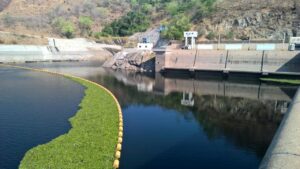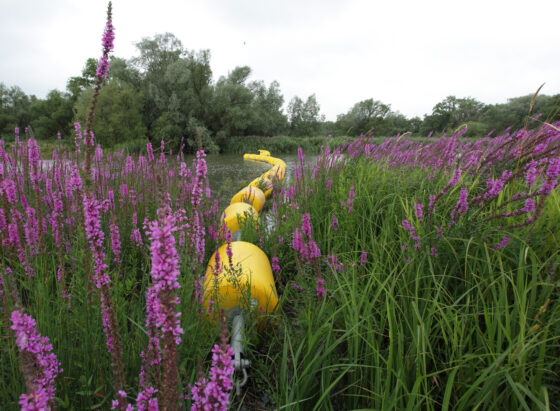
Comment: The state of global marine and waterway protection

Extreme climate events, such as droughts and flooding, are occurring at an increasingly alarming rate worldwide. Last year saw water crises in Germany’s Ahr Valley and parts of Europe, China’s Henan province, and across northern Kenya. What’s more, from marine plastic pollution to fuel spillages, it is clear that the earth’s water resources have already reached a tipping point.
The good news? The world’s water crisis is rising up the global climate agenda, and product engineers including Ecocoast and its UK subsidiary Bolina are leading the way in creating innovative solutions to many of these issues.
2021: The year of catastrophic flooding, climate pledges, and promising developments
Pressure is mounting on utilities, construction companies and the industrial agriculture sector to improve wastewater treatment systems and meet progressively higher standards set by regulators.
Filip Stefanovic, regional general manager of waterway and marine protection company Bolina, shares his thoughts on the greatest challenges the sector faced last year:
“It is already well-documented that plastic waste brings harm to marine life. It has become even more of a global environmental concern since the pandemic, which has led to an increased demand for single-use plastic.”
With at least 14 million tonnes of plastic ending up in the ocean every year, marine plastic pollution threatens food safety and quality, human and animal health, coastal tourism and significantly contributes to climate change. Plastic makes up to 80 per cent of all marine debris found from surface waters to deep-sea sediments, and the issue predominantly originates from urban and stormwater runoff, sewer overflows, littering, inadequate waste disposal and management, industrial activities, tyre abrasion, construction and illegal dumping.
“On the other hand, recreational marine transport decreased significantly”, Stefanovic states. According to reports, there was a drop in ocean traffic density of 70.2 per cent in the Exclusive Economic Zones due to the pandemic.

Catastrophic floods struck western Germany last summer
Stefanovic has been an engineer at Ecocoast for five years. The company was founded precisely to prevent such damage and pollution to coasts and waterways across the globe. Over the last decade or so, with the support of subsidiary Bolina, they have developed a range of industry-leading solutions that have been demonstrated to reduce water pollution from plastic, sewage, construction, marine transport and much more.
He believes that marine protection is no longer a choice, but a necessity that also presents itself as a great opportunity.
The firm has seen substantial growth in the last year, as there is an “increasing need from companies all over the world, in particular Europe, Africa, Canada and the USA, for support with dam and reservoir protection projects”, says Stefanovic. Different types of barriers, when installed, protect critical infrastructure from invasive natural polluters like blue-green algae to large plastic debris that could cause damage.
As a developer of flood damage protection as well as debris barriers, Bolina has witnessed the impact of increased flooding first-hand. Stefanovic notes that “sediments and floating debris collect on structures during floods, clogging waterways and thus creating dangerous situations”. Bolina Debris Booms, which help to manage the impact of flooding by diverting blockages away from crucial points, accounted for 60 per cent of Bolina sales last year. As reports show that both the frequency and intensity of flooding is increasing, it is now more important than ever to implement safeguarding measures to prevent irreversible damage.
Perhaps owing to the aforementioned growing pressure on stakeholders to invest in marine and environmental protection, both Bolina and Ecocoast have seen substantial growth and continue to expand into new areas. In the last 12 months, Stefanovic notes the addition of the following countries: Sweden, Democratic Republic of Congo, Sri Lanka, Switzerland and Equatorial Guinea – bringing its coverage to 56 countries worldwide.

Bolina control booms
Pressure for greener solutions
Whilst he noted that action on water pollution was scarce at Glasgow’s COP26 climate conference, Stefanovic welcomed the discussions and believes they will prompt further development. “Involvement from government organisations and its executive agencies is higher. Discussions at COP26 are likely to bring sustainability and environmental protection more to the masses, increasing pressure on companies, governments and stimulating cooperation between various stakeholders. When it comes to the latter, we have also been seeing an increase in requests from NGOs that are striving to clean the world of plastic”, he says.
Indeed, promising developments from clients represent an exciting new trajectory for Ecocoast and Bolina. Stefanovic finds that his clients are actively looking for alternative solutions to traditional materials. For example, a coastal engineer client was looking for environmentally friendly solutions; biodegradable geotextiles for Geosynthetic Containers (bags and tubes) instead of rock (traditional) for coastal works which Ecocoast was able to provide. He is optimistic that change will come quickly, given that countries like the USA are providing tax incentives to companies that use environmentally friendly products.
What’s next for water protection?
According to Stefanovic, businesses are looking for “more support with debris collection for hydro, weir and reservoir projects”. For his clients, it is becoming particularly important to provide a complete project solution from engineering, all the way through to delivery and installation.
The last considered challenges for the coming year are “marine protected areas, which need greater attention”. Only two per cent of our global oceans are included in strongly protected marine parks, which Stefanovic believes is “also where local, national and international regulations come in and are of key importance.”
A major British investigation launched last year by the regulator Ofwat, in collaboration with the Environment Agency (EA), found that several UK water and sewage facilities are in breach of their permits and failing to meet legal duties. Campaigners petitioned for the investigation after Southern Water was fined a record £90m for pouring between 16bn and 21bn litres of raw sewage into protected coastal waters, reportedly for financial gain. Though shocking, this is sadly not an isolated incident. Rather, new evidence highlights the abundance of sewage pollution ‘hotspots’, which occur globally.
Thus, Bolina’s regional general manager believes that there will be a greater need to reduce sewage discharge and other runoffs into the oceans, and encourages policymakers to shift their focus onto preventing major marine incidents, such as oil spills, rather than managing the aftermath.
